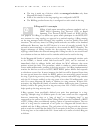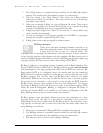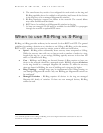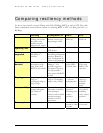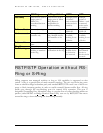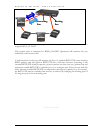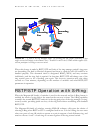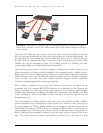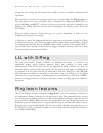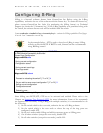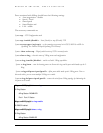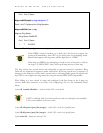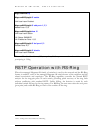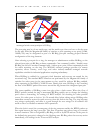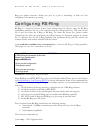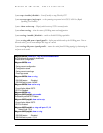
MAGNUM 6K SWITCHES, MNS-6K USER GUIDE
through the two strings for all normal LAN traffic to move as needed to maintain LAN
operations.
When the fault is cured, the re-emergence of the ring structure enables the BPDU packets to
flow again between the ring’s port-pair. This is recognized by S-Ring (and RSTP/STP) as
well as by RS-Ring (and RSTP) , and one of the ports in the ring’s port pair is changed to the
blocking state. S-Ring takes the recovery action immediately, not waiting for the 30-second
STP analysis.
Rings are simple structures. Either one port of a pair is forwarding or both are. Not
complicated; not much to go wrong.
A Link-loss on one of the Magnum 6K Switch’s ring ports is an alternative trigger for S-Ring
to initiate fault recovery. The Link-loss trigger almost always comes quicker after a fault (a
few milliseconds) than the loss of a BPDU packet which is gated by the standard STP 2-
second “hello time” interval. So the Link-loss trigger will almost always provide faster fault
detection and faster recovery accordingly.
LLL with S-Ring
The Link-Loss-Learn™ feature, available on Magnum 6K family of switches can
significantly reduce switch address memory decay time, resulting in more rapid
reconfiguration. With Link-Loss-Learn (LLL), Magnum 6K family switches in a ring can
flush their address memory buffer and quickly re-learn where to send packets, enabling them
to participate in a very quick recovery or restoration. Note that a Link-loss on any Magnum
6K Switch port somewhere in the ring is an alternative trigger for S-Ring to act for either
fault recovery or ring restoration. The interruption (or the restoration) of the flow of BPDU
packets is one trigger, link-loss is another, and action is taken by S-Ring based on whichever
occurs first.
Ring learn features
One of the S-Ring software commands, “s-ring learn”, causes the scanning of all ports in
the Magnum 6K family of switches for the presence of rings. This command can be a handy
tool in setting up the S-Ring product for correct initial operation. During a ring-learn scan, if
any port receives a BPDU packet that was also originated by the same switch, the source and
destination ports are designated as a ring port-pair and they are automatically added to the S-
Ring port-pair list for that 6K Switch. The user can enable or disable ports pairs that are on
the S-Ring list by CLI commands in order to exercise final control if needed. This feature is
not available with RS-Ring.
158



